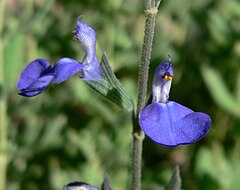Difference between revisions of "Salvia chamaedryoides"
From Gardenology.org - Plant Encyclopedia and Gardening Wiki
Jump to navigationJump to search| Line 22: | Line 22: | ||
|exposure=sun | |exposure=sun | ||
|sun_ref=Flora - A Gardener's Encyclopedia | |sun_ref=Flora - A Gardener's Encyclopedia | ||
| − | |features=evergreen, flowers | + | |features=evergreen, flowers, fire resistant |
|flower_season=early spring, mid spring, late spring, early summer, mid summer, late summer, early fall, mid fall, late fall | |flower_season=early spring, mid spring, late spring, early summer, mid summer, late summer, early fall, mid fall, late fall | ||
|flowers=blue, purple | |flowers=blue, purple | ||
Latest revision as of 23:18, 29 September 2013
| Habit | herbaceous
| |
|---|---|---|
| Height: | ⇕ | 12 in"in" can not be assigned to a declared number type with value 12. to 24 in"in" can not be assigned to a declared number type with value 24. |
| Width: | ⇔ | 12 in"in" can not be assigned to a declared number type with value 12. to 20 in"in" can not be assigned to a declared number type with value 20. |
| Lifespan: | ⌛ | perennial |
| Bloom: | ❀ | early spring, mid spring, late spring, early summer, mid summer, late summer, early fall, mid fall, late fall |
| Exposure: | ☼ | sun |
|---|---|---|
| Features: | ✓ | evergreen, flowers, fire resistant |
| USDA Zones: | 8 to 11 | |
| Flower features: | ❀ | blue, purple |
|
Salvia > |
Cav. > |
Salvia chamaedryoides, or Germander sage, is an evergreen perennial native to the high desert (2100-2800 m elevation) of the Sierra Madre Oriental range in Mexico. Its name comes from sharing the running rootstock typical of Teucrium chamaedrys (Wall germander). Spreading freely, it reaches a height of 60 cm when in bloom, with small grey evergreen foliage. The flowers are blue, appearing sporadically throughout the growing season, with peaks of bloom in early summer and autumn. It has been grown in European horticulture since the early 1800s, but was only introduced to the U.S. in the 1980s.[1]
Cultivation
Propagation
Pests and diseases
Varieties
Gallery
References
- ↑ Clebsch, Betsy; Carol D. Barner (2003). The New Book of Salvias. Timber Press. p. 70. ISBN 9780881925609. http://books.google.com/books?id=NM0iwB8GrQYC&pg=PA70.
External links
- w:Salvia chamaedryoides. Some of the material on this page may be from Wikipedia, under the Creative Commons license.
- Salvia chamaedryoides QR Code (Size 50, 100, 200, 500)


